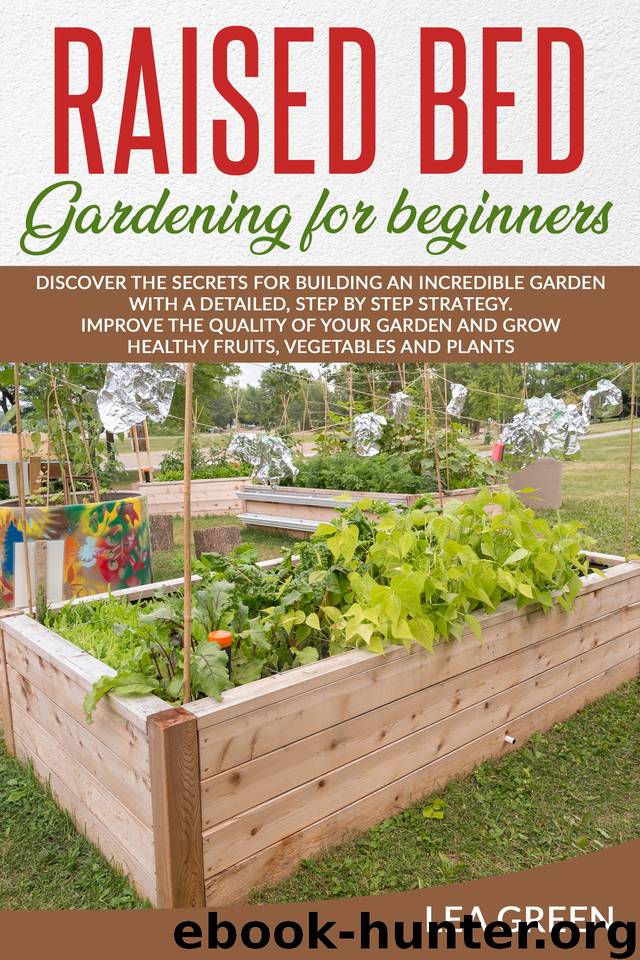RAISED BED GARDENING FOR BEGINNERS: DISCOVER THE SECRETS FOR BUILDING AN INCREDIBLE GARDEN WITH A DETAILED, STEP BY STEP STRATEGY. IMPROVE THE QUALITY OF YOUR GARDEN AND GROW HEALTHY FRUITS, VEGETABL by GREEN LEA

Author:GREEN, LEA [GREEN, LEA]
Language: eng
Format: epub, azw3
Published: 2020-07-25T16:00:00+00:00
Chrysanthemums
Some of the substances contained in these plants are quite toxic to numerous insects, especially root nematodes and Japanese beetles.
Dahlias
Not only do dahlias have beautiful flowers, they continue to produce these striking flowers year after year, growing from their tubers underground. The additional benefit is that they repel nematodes.
Geraniums
Another very attractive plant that produces pretty flowers, this plant is quite effective in repelling beet leafhoppers, cabbageworms and Japanese beetles. Not just a pretty face!
Chives
You have already heard this small plant mentioned several times earlier and not without reason. With its pretty little flowers and thin leaves looking like grass, it will look good in any kind of garden and help to keep away all types of harmful pests like aphids. Plant them close to tomatoes, carrots and cruciferous vegetables, but stay away from peas and beans.
Dill
This herb is cherished not only for the subtle taste it lends to many dishes, but organic gardeners often utilize it to prevent pests from populating their cabbage and squash gardens. The large flowers are an attraction for predatory wasps as well as other insects that keep these pests from infiltrating. Dill attracts tomato hornworm, though, so be sure not to plant it anywhere near your peppers, potatoes or tomatoes.
Garlic
The Allium family includes onions, chives and leeks, but garlic is its most pungent member. They all do excellent work in repelling harmful insects and keeping them at bay. The sweet nectar in their flowers will attract bees as well as other pollinators.
Sage
Never plant cabbages or carrots without their protecting companion, sage. This herb is the archenemy of cabbage moths and carrot flies. It will benefit tomatoes too.
Basil
Who does not love the wonderful fragrance of a crushed basil leaf? Well, this is exactly why they repel mosquitoes, flies, and other harmful insects. They also add flavor to tomatoes and peppers.
Rosemary
There are no negative aspects to this plant at all; to the contrary, stunning rosemary is not only a must in every herb garden, it keeps almost all kinds of invasive insects at bay and its wonderful smell and flowers attract bees and pollinators.
Research is Important
Start your companion raised garden by deciding on which vegetables you want to grow. Then continue to do proper research to determine the plants that will flourish in your climate zone. Next, plan the layout of your garden. Before you start planting, determine which companion plants will benefit your selected vegetable plants. Lastly, make sure to utilize your available space to its maximum.
Companion gardening work wonderfully in the small spaces of raised beds or planters. Using this technique as well as thorough planning before you begin the raise bed vegetable garden will almost guarantee you a continual supply of nutritious vegetable year-round.
Download
RAISED BED GARDENING FOR BEGINNERS: DISCOVER THE SECRETS FOR BUILDING AN INCREDIBLE GARDEN WITH A DETAILED, STEP BY STEP STRATEGY. IMPROVE THE QUALITY OF YOUR GARDEN AND GROW HEALTHY FRUITS, VEGETABL by GREEN LEA.azw3
This site does not store any files on its server. We only index and link to content provided by other sites. Please contact the content providers to delete copyright contents if any and email us, we'll remove relevant links or contents immediately.
Turbulence by E. J. Noyes(7062)
The Thirst by Nesbo Jo(5804)
Gerald's Game by Stephen King(3931)
Be in a Treehouse by Pete Nelson(3239)
Marijuana Grower's Handbook by Ed Rosenthal(3133)
The Sprouting Book by Ann Wigmore(3064)
The Red Files by Lee Winter(2926)
The Remains of the Day by Kazuo Ishiguro(2629)
Sharp Objects: A Novel by Gillian Flynn(2458)
Christian (The Protectors Book 1) by L. Ann Marie(2397)
Organic Mushroom Farming and Mycoremediation by Tradd Cotter(2316)
The Culinary Herbal by Susan Belsinger(2066)
Stone Building by Kevin Gardner(2000)
The Starter Garden Handbook by Alice Mary Alvrez(1932)
Lilac Girls by Martha Hall Kelly(1885)
The Unlikely Pilgrimage of Harold Fry by Rachel Joyce(1841)
The Lean Farm Guide to Growing Vegetables: More In-Depth Lean Techniques for Efficient Organic Production by Ben Hartman(1792)
Urban Farming by Thomas Fox(1757)
Backyard Woodland by Josh VanBrakle(1594)
